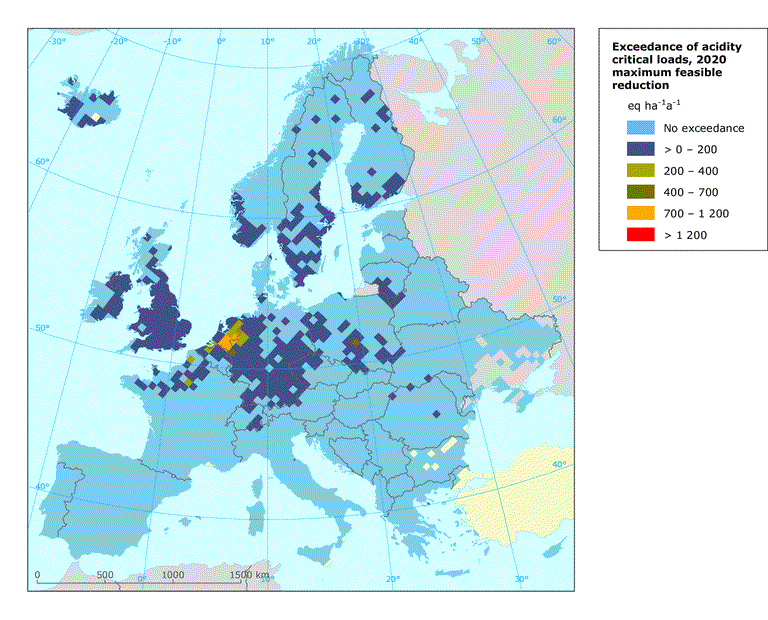All official European Union website addresses are in the europa.eu domain.
See all EU institutions and bodiesExceedance of critical loads for acidification by deposition of nitrogen and sulphur compounds in 2020 assuming a Maximum Feasible Reductions scenario
Map (static)
The results were computed using the 2008 Critical Loads database hosted by the Coordination Centre for Effects (CCE).

- Exceedance of critical loads for the most sensitive ecosystems (dataset URL is not available)
- Albania
- Austria
- Belgium
- Bosnia and Herzegovina
- Bulgaria
- Croatia
- Cyprus
- Czechia
- Denmark
- Estonia
- Finland
- France
- Germany
- Greece
- Hungary
- Iceland
- Ireland
- Italy
- Latvia
- Liechtenstein
- Lithuania
- Luxembourg
- North Macedonia
- Malta
- Montenegro
- Netherlands
- Norway
- Poland
- Portugal
- Romania
- Serbia
- Slovakia
- Slovenia
- Spain
- Sweden
- Switzerland
- United Kingdom
The results were computed using the 2008 Critical Loads database hosted by the Coordination Centre for Effects (CCE). Deposition data was made available by the Centre for Integrated Assessment Modelling under the LRTAP Convention at the International Institute for Applied Systems Analysis (IIASA) in autumn 2007. The deposition estimates for CSI 005 Figures 5-8 were based on two emissions scenarios: current legislation (CLE) in 2000, 2010, 2020 and maximum feasible reductions (MFR) in 2020. Turkey has not been included in the analyses due to a not sufficient data basis for calculating critical loads. For Malta no data was available. The territory of Serbia and Montenegro is treated as one critical loads/exceedance area in the CCE dataset. The Coordination Centre for Effects (CCE) is the data centre of the International Cooperative Programme for the Modelling & Mapping (ICP M&MP) of Critical Levels and Loads and Air Pollution Effects, Risks and Trends under the Convention on Long-range Transboundary Air Pollution (LRTAP Convention) at the UNECE. Besides critical loads (exceedance) calculations, the CCE is also responsible for the development of modeling methodologies and databases for the integrated assessment of effects of air pollution (under climate change) on biodiversity in European natural areas, including Natura 2000 sites.
